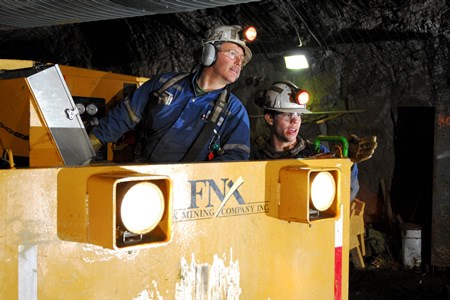When a research scientist with the Geological Survey of Canada recently spent some time at FNX Mining Company Inc.’s Sudbury offices, she soon found herself adrift in a sea of company-branded clothing.
“Even I was wearing my company windbreaker, and she made the comment to me of ‘Gee, everybody who works here has FNX clothing on,’ and it’s true,” says Catharine Farrow, vice-president of exploration.
“We operate differently here at FNX, and I think it’s working well, and I think people are proud to work here.”
Since 2002, FNX has gone from a single employee - founder and CEO Terry MacGibbon - to more than 1,800 employees, 700 of which are located in the Sudbury area.
With this kind of aggressive growth, fueled in part through the production of the local Levack, McCreedy West and Podolsky mines, FNX has put a premium on its personnel.
In turn, this has allowed for staff to have plenty of room to move up through the ranks while having their voice heard on any number of issues.
However, the company has had to look to creative solutions to shore up their own shortages while continuing to keep the employees front and centre.
While many larger companies make use of “elite” special projects teams to take on certain sets of tasks or troubleshoot problems that arise, FNX has committed to a more streamlined approach.
Regular staff members are instead pulled from their day-to-day tasks to embark upon these special projects, which are then designed as training opportunities to provide them with experience they might not have otherwise had.
Given the growing nature of the relatively young firm, there’s also a company-wide celebration of an entrepreneurial, roll-up-your-sleeves work ethic where good ideas are embraced and typical corporate attitudes are set aside.
This has found officials openly embracing staff-driven initiatives, including one training program initiated and designed entirely by a manager and two senior technical staff throughout this past summer.
Other examples of staff being empowered to take shared ownership of their hard work includes their occasional involvement in what would typically be upper-level decisions.
Given the tight-knit nature of many of the teams in place throughout the company, some are even encouraged to provide their input into the hiring process.
Recently, one such team was given the opportunity to interview someone applying for a senior technical position to ensure that they match the cohesion and chemistry of the group.
These kinds of non-traditional approaches are rife at FNX, where many corporate policies are still being assembled as the company moves forward. This gives staff at all levels the chance to participate in processes that would typically have been pre-determined years prior, or would be entirely inaccessible.
“That’s one of the exciting things about working here, in that many of us bring our experiences from Western Mining Corporation (WMC) or Inco or wherever, but we can park our attitudes at the door and ask, ‘Is how we did things really the best way?’” says Farrow.
Farrow admits such measures are as much out of necessity as they are of design, given the need to balance making the best of existing employees while providing them with continued opportunities for growth.
Officials have recently instituted a company-wide program called Courageous Leadership. While many other companies have adopted the program, Farrow says FNX is the first company of its size to put it into place.
The program offers strong leadership skills, an understanding of health and safety as well as teamwork, positive relationships and supportive thinking.
“We have been able to retain our people, but you should never, ever get complacent about that, and I don’t believe that we have.”




